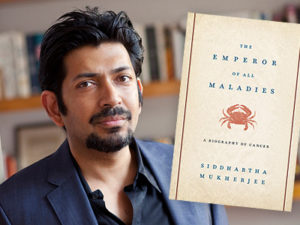
Oncologist Siddhartha Mukherjee began writing The Emperor of All Maladies: A Biography of Cancer after a conversation with one of his patients.
The woman, gravely ill with abdominal cancer, told Mukherjee that she was willing to fight her illness, but needed to know exactly what she was fighting.
Mukherjee’s book, winner of the 2011 Pulitzer Prize for general nonfiction, is an attempt to provide a kind of answer. It traces the history of the disease and of the efforts, over several millennia, to define it, understand it, cope with its effects, and cure it.
Mukherjee will tell the story of cancer when he speaks on Sunday, February 19, as part of the College’s Science Talks series.
As a cancer physician and assistant professor of medicine at Columbia University, Mukherjee is one of a legion of doctors and scientists who have contended with the disease since it made its first appearance in recorded history more than 4,000 years ago. As Mukherjee points out, treatments—from medieval bloodlettings to the crude mastectomies of the 19th century—often have been as deadly as the disease itself. He observes that every era has cast cancer in its own image, seeking solutions in the preoccupations of the time. The late 20th century’s “war on cancer,” for example, sought to marshal state resources to “defeat” the disease. Today’s scientific interest in genetics has shifted the focus of research to possible hereditary causes—an approach that Mukherjee finds promising.
His book combines intellectual history with the story of Mukherjee’s efforts to care for his patients and come to terms with the limitations of his own profession. The New Yorker called it an “extraordinary achievement” and The New York Times named it a Best Book of 2010.
The Emperor of All Maladies is part of the Roland Quest Lecture Series. Mukherjee’s talk begins at 7:00 p.m. in Hammerschmidt Memorial Chapel. The lecture is free and open to the public. For more information, call (630) 617-3390.